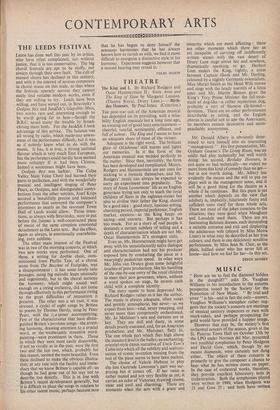THEATRE
The King and I. By Richard Rodgers and Oscar Hammerstein II • from Anna and The King of Siam by Margaret Landon. (Theatre Royal, Drury Lane.)—Birth- day Honours. By Paul Jones. (Criterion.) THE post-war cult of the American musical has depended on its providing, with a relia- bility English musicals lost a long time ago, an evening out of good lusty,entertainment- cheerful, tuneful, sentimental, efficient, and full of colour. The King and I seems to have an adequate share of most of the virtues.
Adequate is the right word. The brilliant glow of Oklahoma! still warms and lights our memories. In it the form of the American musical was wedded perfectly to the matter. Since then, inevitably, the form has been developed and complicated. Messrs. Rodgers and Hammerstein are not ones for sticking to a formula themselves, and Mr. Rodgers' music can always be expected to carry an experiment into popularity. The story of Anna Leonowens' life as an English governess trying not only to teach the royal children of Siam in the eighteen-sixties but also to civilise their father the King, should be a good idea : good story, luscious setting, charming period, imperial preference, English market, etcetera—as the King keeps on saying—and etcetera. But perhaps it has too much. For as a story of real people it demands a certain subtlety of telling and a depth of characterisation which are not Mr. Oscar Hammerstein II's strongest suits.
Even so, Mr. Hammerstein might have got away with his unsatisfactorily naive dialogue and characterisation had not his producer exposed him by conducting the piece at a wearyingly pedestrian speed. In other ways Mr. John van Druten gives some delightful touches of pure production, like his handling of the one-by-one entry of the royal children to meet their new governess, where, without a word spoken on stage, he invests each child with a complete identity.
The story seems to have depressed Mr. Richard Rodg.ers rather as it has the author. The music is always adequate, often sweet and prettily atmospheric, but never—as we expect from him—vital, never sweeping, and never more than competently orchestrated. Mr. Jo Mielziner's sets and curtains are in key. They are dull and dusty, in some details poorly executed, and, for an American production and Mr. Mielziner; flatly lit. The one whole part which flies high above the standard level is the ballet; an enchanting, oriental-style dance narrative of Uncle Tom's Cabin into which all the subtlety and sophisti- cation of comic invention missing from the rest of the piece seems to have been packed.
The choice of Valerie Hobson to play the .late Gertrude Lawrence's part was sur- prising but it comes off. If her voice . is rather muted and not very flexible as yet, it carries an echo of Victorian drawing rooms, clear and cool and charming. There are moments when she acts with a grace and sincerity which are most affecting : there are other moments which show her as yet incapable of carrying off indifferently written scenes with the vast desert of Drury Lane stage about her and nowhere, dramatically speaking, to go. Herbert Lom makes the King, rightly, a cross between Captain Hook and Mr. Darling, coloured by a slightly Germanic orientalism. Miss Muriel Smith as the Head Wife moves and sings with the heady warmth of a lotus eater and Mr. Martin Benson gives the King's Tory Prime Minister the full treat- ment of dog-like—a rather mysterious dog, probably a sort of Siamese elk-hound- devotion. There are no other performances describable as acting, and the English chorus is careful not to ape the Americans; its members remain decorative and unim- peachably anonymous.
Mr. Donald Albery is obviously deter- mined to turn himself into an interesting "management." His first presentation, Mr. Graham Greene's The Living Room, was an oddly bad play technically but well worth doing: his second, Birthday Honours, is not quite so bad technically—we expect no more from this kind of comedy than we get— but is not worth doing. Mr. Albery has evidently the means and the will to put on 'plays well in the management sense, and it will be a good thing for the theatre as a whole if he continues. But this piece is yet another which depends on the view that adultery is, implicitly, hilariously funny and sufficient unto itself for three whole acts. There are most of the jokes common to the situation; they were good when Maugham and Lonsdale used them. There are six fascinating Balmain dresses, each demanding a suitable entrance and exit and displaying the adulterous wife (played by Miss Moira Lister) in what may be described as her true colours; and there is one deliciously sensitive performance, by Miss Jean St. Clair, as the plain, bullied sister who has never felt at home—and how we feel for her—in this set.
DEREK MONSEY


































 Previous page
Previous page